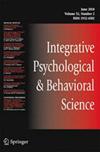The QBIT Theory: Consciousness from Entangled Qubits.
IF 1.1
4区 心理学
Q4 PSYCHOLOGY, BIOLOGICAL
Integrative Psychological and Behavioral Science
Pub Date : 2024-12-01
Epub Date: 2022-12-25
DOI:10.1007/s12124-022-09745-w
引用次数: 0
Abstract
How does the brain generate consciousness? The present paper is an attempt to answer this question from the perspective of the QBIT theory. In sum, the theory argues that the brain has a prior belief (P) about the stimulus that has caused a sensory representation (R) to be created in the brain. When the conditional entropy of P given R becomes less than zero, the brain becomes more than certain about (i.e. becomes conscious of) the stimulus. Conditional entropy can become negative (and thus the brain can become more than certain) only if the brain uses entangled quantum information in its computations. The QBIT theory suggests that, at the most fundamental level, consciousness is nothing but a special kind of entangled information.
QBIT 理论:来自纠缠质子的意识。
大脑是如何产生意识的?本文试图从 QBIT 理论的角度回答这个问题。总之,该理论认为,大脑对刺激有一个先验信念(P),该信念导致大脑中产生了感觉表征(R)。当给定 R 的 P 的条件熵小于零时,大脑就会对刺激变得更加确定(即对刺激有意识)。只有当大脑在计算中使用纠缠的量子信息时,条件熵才能变为负值(从而大脑才能变得更加确定)。QBIT 理论认为,在最基本的层面上,意识只不过是一种特殊的纠缠信息。
本文章由计算机程序翻译,如有差异,请以英文原文为准。
求助全文
约1分钟内获得全文
求助全文
来源期刊

Integrative Psychological and Behavioral Science
Psychology-Social Psychology
CiteScore
2.50
自引率
16.70%
发文量
66
期刊介绍:
IPBS: Integrative Psychological & Behavioral Science is an international interdisciplinary journal dedicated to the advancement of basic knowledge in the social and behavioral sciences. IPBS covers such topics as cultural nature of human conduct and its evolutionary history, anthropology, ethology, communication processes between people, and within-- as well as between-- societies. A special focus will be given to integration of perspectives of the social and biological sciences through theoretical models of epigenesis. It contains articles pertaining to theoretical integration of ideas, epistemology of social and biological sciences, and original empirical research articles of general scientific value. History of the social sciences is covered by IPBS in cases relevant for further development of theoretical perspectives and empirical elaborations within the social and biological sciences. IPBS has the goal of integrating knowledge from different areas into a new synthesis of universal social science—overcoming the post-modernist fragmentation of ideas of recent decades.
 求助内容:
求助内容: 应助结果提醒方式:
应助结果提醒方式:


